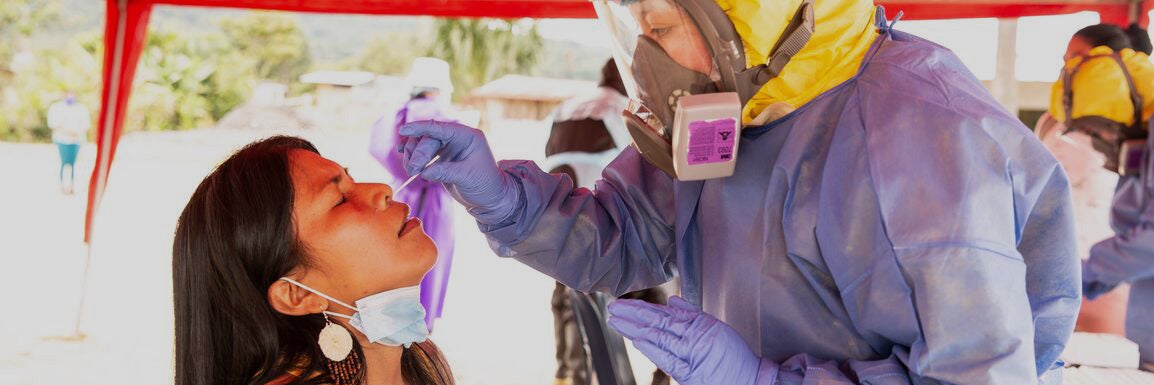Rapid RESCUE: Amazonia
The expansive Amazonia rainforest is perhaps the most iconic and well-known of the world’s wildlands. It is a lush tropical landscape that is not just one rainforest, but in fact, home to half of the world’s tropical forests, in addition to the largest river system on Earth. Extending across all or part of eight countries (Brazil, Bolivia, Colombia, Ecuador, Guyana, Peru, Suriname, Venezuela, and the French overseas department of French Guiana), Amazonia is one of the world’s five designated High-Biodiversity Wilderness Areas.
This irreplaceable place is also critically important to approximately 20 million Indigenous peoples from more than 350 Indigenous groups, several of whom still live in voluntary isolation from the outside world. These Indigenous peoples depend on natural ecosystems and resources for their livelihoods and culture, and have traditionally lived in harmony with their natural environments for generations.
The COVID-19 pandemic and associated lockdowns posed unique challenges to these communities and their ability to defend Amazonia from rapidly growing extractive industries. The Rapid RESCUE Fund —established by Re:wild and the European Union—has supported or is continuing to support a critical emergency response to COVID-19 to ensure a resilient Amazonia with a strong foundation for post-COVID-19 recoveries.
Building resilience in Indigenous communities against development projects
COVID-19 has had extensive negative impacts on Indigenous and isolated peoples, weakening health systems and accelerating extractive industries.
Rapid RESCUE and Indigenous communities in the Amazon
The Rapid RESCUE Fund is increasing the resiliency of Indigenous communities against health risks and intensifying development activities by providing the tools and resources to help communities protect and defend their territories in Brazil, Paraguay, Ecuador and Suriname.
Total project costs: $280,472 ($93,491 Rapid RESCUE funding; $186,981 co-financing)
Scaling Indigenous-led conservation in the upper Amazon
Post-COVID economic recovery plans across the Amazon in Ecuador, Peru and Colombia include the acceleration of extractive industries as well as weakened incentives for conservation and weak legal frameworks and law enforcement across the Amazon. This has created an immediate threat to Indigenous territories and Indigenous ways of life.
Rapid RESCUE in the northern Amazon
The rapid RESCUE Fund is providing Indigenous communities with the tools, resources and networks they need to secure their rights, protect their forests and rivers, govern their territories, and create thriving, resilient communities.
Total project costs: $1,500,000 ($500,000 Rapid RESCUE funding; $1,000,000 co-financing)
Protecting the Mashco Piro people from COVID-19
The negative impacts of the COVID-19 pandemic on the isolated and Indigenous Mascho Piro people of the Peruvian Amazon has resulted in reduced forest protection and increased deforestation in the face of COVID-19 shutdowns.
Rapid RESCUE in the Peruvian Amazon
The Rapid RESCUE Fund supports the Asociación para la Conservación de la Cuenca Amazónica (ACCA) in building capacity to enhance the Mascho Piro people’s ability to protect the forests, while also supporting the Mascho Piro people in their efforts to establish the Madre de Dios Territorial Reserve as an officially recognized Indigenous Reserve.
Total project costs: $765,000 ($255,000 Rapid RESCUE funding; $510,000 co-financing)
Addressing ethno-environmental emergencies in the Brazilian Amazon
The loosening of environmental policies during the COVID-19 pandemic has led to increased threats to local and Indigenous communities in the Brazilian Amazon as the result of escalating deforestation and illegal activities.
Rapid RESCUE in the Brazilian Amazon
The Rapid RESCUE Fund helps Indigenous communities implement sustainable socioeconomic models and promote the economic recovery of rural communities through regenerative agriculture and organic property management.
Total project costs: $3,022,304 ($1,000,000 Rapid RESCUE funding; $2,022,304 co-financing)
Saving Colombia’s Chiribiquete
Changes in economic and political institutions have led to the rapid deforestation and deterioration of biodiversity in the La Paya corridor. Local communities are disproportionately affected by deepening inequality and inequity.
Rapid RESCUE in the La Paya corridor
The Rapid RESCUE Fund is helping Indigenous peoples and campesino communities mitigate pressures on forests, preserve biological and cultural diversity, and reduce social and environmental conflicts.
Total project costs: $1,610,913.02 ($536,971.51 Rapid RESCUE funding; $1,073,941.51 co-financing)
Regenerative agriculture and conservation in Ecuador
The COVID-19 pandemic has exacerbated deforestation, extractive industries, hydro-power development, and the bushmeat trade, all of which has had rapid negative impacts on Indigenous communities living in the buffer region of Ecuador's Sumaco-Galeras National Park.
Rapid RESCUE in Ecuador
The Rapid RESCUE Fund supports Fundación Aliados in its efforts to strengthen community resilience through regenerative agroforestry and conservation in the Sumaco National Park buffer region of Ecuador.
Total project costs: $985,015 ($313,082 Rapid RESCUE funding; $671,933 co-financing)





